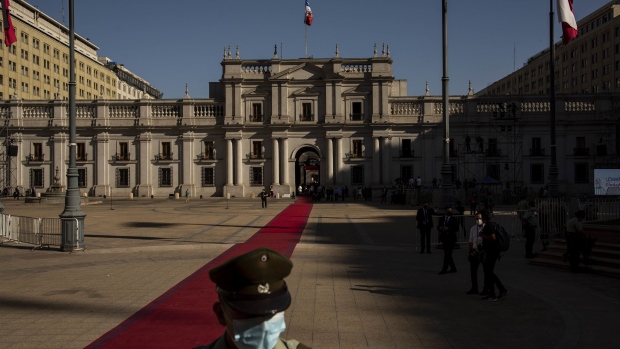Feb 7, 2023
Chilean Parties Split Over Candidates for Constitutional Rewrite
, Bloomberg News

(Bloomberg) -- Chile’s main political blocs presented multiple candidate lists for the body that will help draft the nation’s new constitution, increasing the odds of a more moderate charter rewrite.
Both leftist and right-wing opposition parties late on Monday each presented two lists of contenders for the 50-seat constitution council that voters will elect in May. Political divisions, particularly in President Gabriel Boric’s base of support, should help candidates with centrist views, according to analysts.
Chile is embarking on another attempt at rewriting the nation’s basic laws after voters overwhelmingly rejected a proposed charter in last year’s referendum. The plan is to replace the current document, which was enforced during the Augusto Pinochet dictatorship. At stake are the rules that transformed the South American nation into a global investor favorite.
Read more: Chile Experts Warn of Unforeseen Risks in Constitution Rewrite
Polls show that 40% of Chileans identify as moderates, meaning “there is demand for centrist views,” according to Mauricio Morales, a professor of political science at Chile’s Universidad de Talca. The alliance led by the Christian Democrats and the Partido por la Democracia, as well as the center-right bloc, will compete to win this segment, he said.
A total of five lists with about 350 candidates will compete in the obligatory vote for the council, which will spearhead writing from June onwards. The final product, which will be drafted together with input from a committee of experts, will be put to a national referendum in December.
Meanwhile, the Socialist Party decided to join a list with Boric’s left-wing Apruebo Dignidad coalition instead of working with more moderate groups with which it formed an alliance in the 1990s and 2000s.
The fact congress appointed the committee of experts and also that all of the council candidates are from traditional parties clears the way for less extreme ideals in the text, said Axel Callis, a political analyst and director of polling firm TuInfluyes.com.
“This will be a constitution where the right will have much more power than in the first process considering the established quorums and the electoral rules,” said Kenneth Bunker, political analyst at consulting firm Politico Tech Global. “The result will be more mixed and moderate than in the first proposal.”
©2023 Bloomberg L.P.







